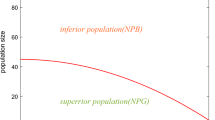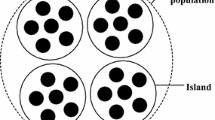Abstract
Differential evolution (DE) relies mainly on its mutation mechanism to guide its search. Generally, the parents involved in mutation are randomly selected from the current population. Although such a mutation strategy is easy to use, it is inefficient for solving complex problems. Hence, how to utilize population information to further enhance the search ability of the mutation operator has become one of the most salient and active topics in DE. To address this issue, a new DE framework with the concept of index-based neighborhood, is proposed in this study. The proposed framework is named as neighborhood guided DE (NGDE). In NGDE, a neighborhood guided selection (NGS) is introduced to guide the mutation process by extracting the promising search directions with the neighborhood information. NGS includes four main operators: neighborhood construction, neighbors grouping, two-level neighbors ranking, and parents selection. With these four operators, NGS can utilize the topology and fitness information of population simultaneously. To evaluate the effectiveness of the proposed approach, NGS is applied to several original and advanced DE algorithms. Experimental results have shown that NGDE generally outperforms most of the corresponding DE algorithms on different kinds of optimization problems.






Similar content being viewed by others
Notes
If the base vector is the best-so-far individual or the target individual of population, it does not need to be selected based on the selection probability.
The detailed implementations and the source code of NGDE can be obtained from the first author.
References
Alcalá-Fdez J, Sánchez L, García S (2016) Keel: a software tool to assess evolutionary algorithms to data mining problems. http://www.keel.es/
Biswas S, Kundu S, Das S (2015) Inducing niching behavior in differential evolution through local information sharing. IEEE Trans Evol Comput 19(2):246–263
Brest J, Greiner S, Boskovic B, Mernik M, Zumer V (2006) Self-adapting control parameters in differential evolution: a comparative study on numerical benchmark problems. IEEE Trans Evol Comput 10(6):646–657
Cai Y, Wang J (2013) Differential evolution with neighborhood and direction information for numerical optimization. IEEE Trans Cybern 43(6):2202–2215
Cai Y, Wang J, Yin J (2012) Learning-enhanced differential evolution for numerical optimization. Soft Comput Fusion Found Methodol Appl 16:303–330
Cai Y, Chen Y, Wang T, Tian H (2015) Improving differential evolution with a new selection method of parents for mutation. Front Comput Sci 1–24. doi:10.1007/s11704-015-4480-8
Cai Y, Wang J, Chen Y, Tian W, Hui T (2016) Adaptive direction information in differential evolution for numerical optimization. Soft Comput 20(2):465–494
Caraffini F, Iacca G, Neri F, Picinali L, Mininno E (2013) A cma-es super-fit scheme for the re-sampled inheritance search. In: 2013 IEEE congress on evolutionary computation (CEC). IEEE, pp 1123–1130
Cheng R, Jin Y (2015) A social learning particle swarm optimization algorithm for scalable optimization. Inf Sci 291:43–60
Chow CK, Yuen SY (2011) An evolutionary algorithm that makes decision based on the entire previous search history. IEEE Trans Evol Comput 15(6):741–769
Das S, Suganthan P (2010) Problem definitions and evaluation criteria for CEC 2011 competition on testing evolutionary algorithms on real world optimization problems. Jadavpur University, Nanyang Technological University, Kolkata
Das S, Suganthan P (2011) Differential evolution: a survey of the state-of-the-art. IEEE Trans Evol Comput 15(1):4–31
Das S, Abraham A, Chakraborty UK, Konar A (2009) Differential evolution using a neighborhood-based mutation operator. IEEE Trans Evol Comput 13(3):526–553
Dorronsoro B, Bouvry P (2010) Differential evolution algorithms with cellular populations. In: Parallel problem solving from nature, PPSN XI. Springer, New York, pp 320–330
Dorronsoro B, Bouvry P (2011) Improving classical and decentralized differential evolution with new mutation operator and population topologies [J]. IEEE Trans Evol Comput 15(1):67–98
Elsayed SM, Sarker R, Essam DL et al (2013) A genetic algorithm for solving the CEC’13 competition problems on real-parameter optimization. In: 2013 IEEE congress on evolutionary computation (CEC). IEEE, pp 356–360
Epitropakis MG, Tasoulis DK, Pavlidis NG, Plagianakos VP, Vrahatis MN (2011) Enhancing differential evolution utilizing proximity-based mutation operators. IEEE Trans Evol Comput 15(1):99–119
Fan Q, Yan X (2016) Self-adaptive differential evolution algorithm with zoning evolution of control parameters and adaptive mutation strategies. IEEE Trans Cybern 46(1):219–232
García S, Fernández A, Luengo J, Herrera F (2009) A study of statistical techniques and performance measures for genetics-based machine learning: accuracy and interpretability. Soft Comput 13(10):959–977
Gong W, Cai Z (2013) Differential evolution with ranking-based mutation operators. IEEE Trans Cybern 43(6):2066–2081
Gong W, Cai Z, Ling C (2010) De/bbo: a hybrid differential evolution with biogeography-based optimization for global numerical optimization. Soft Comput 15(4):645–665
Gong W, Cai Z, Liang D (2015a) Adaptive ranking mutation operator based differential evolution for constrained optimization. IEEE Trans Cybern 45:716–727
Gong W, Zhou A, Cai Z (2015b) A multioperator search strategy based on cheap surrogate models for evolutionary optimization. IEEE Trans Evol Comput 19:746–758
Islam S, Das S, Ghosh S, Roy S, Suganthan P (2012) An adaptive differential evolution algorithm with novel mutation and crossover strategies for global numerical optimization. IEEE Trans Syst Man Cybern B Cybern 42(2):482–500
Kennedy J (1999) Small worlds and mega-minds: effects of neighborhood topology on particle swarm performance. In: Proceedings of the 1999 congress on evolutionary computation (CEC’99) (1999)
Kennedy J, Mendes R (2006) Neighborhood topologies in fully informed and best-of-neighborhood particle swarm. IEEE Trans Syst Man Cybern Part C 36(4):515–519
Kova\(\ddot{c}\)ević D, Mladenović N, Petrović B, Milo\(\ddot{s}\)ević P (2014) De-vns: self-adaptive differential evolution with crossover neighborhood search for continuous global optimization. Comput Oper Res 52[Part B(0)]:157–169. doi:10.1016/j.cor.2013.12.009
Li J, Wang Y (2006) Universal designated verifier ring signature (proof) without random oracles. In: Embedded and ubiquitous computing., international conference (EUC). Lecture notes in computer science. Springer, Berlin, pp 332–341
Li L, Tang K (2015) History-based topological speciation for multimodal optimization. IEEE Trans Evol Comput 19:136–150
Li X, Tang K, Omidvar MN, Yang Z, Qin K, China H (2013) Benchmark functions for the CEC 2013 special session and competition on large-scale global optimization. Gene 7(33):8
Liang J, Qu B, Suganthan P, Hernández-Díaz AG (2013) Problem definitions and evaluation criteria for the CEC 2013 special session on real-parameter optimization. Computational Intelligence Laboratory, Zhengzhou University, Zhengzhou, China and Nanyang Technological University, Singapore. Technical Report 201212
Liao J, Cai Y, Chen Y, Wang T, Tian H (2015a) Differential evolution enhanced with composite population information based mutation operators. J Digit Inf Manag 13(4):211
Liao J, Cai Y, Wang T, Tian H, Chen Y (2015b) Cellular direction information based differential evolution for numerical optimization: an empirical study. Soft Comput 1–27. doi:10.1007/s00500-015-1682-9
Mallipeddi R, Suganthan P, Pan Q, Tasgetiren M (2011) Differential evolution algorithm with ensemble of parameters and mutation strategies. Appl Soft Comput 11(2):1679–1696
Nepomuceno FV, Engelbrecht AP (2013) A self-adaptive heterogeneous pso for real-parameter optimization. In: 2013 IEEE congress on evolutionary computation (CEC). IEEE, pp 361–368
Neri F, Tirronen V (2010) Recent advances in differential evolution: a survey and experimental analysis. Artif Intell Rev 33(1–2):61–106
Noman N, Iba H (2011) Cellular differential evolution algorithm. In: AI 2010: advances in artificial intelligence. Springer, New York, pp 293–302
Noroozi V, Hashemi AB, Meybodi MR (2011) Cellularde: a cellular based differential evolution for dynamic optimization problems. In: Adaptive and natural computing algorithms. Springer, New York, pp 340–349
Omran MG, Engelbrecht AP, Salman A (2009) Bare bones differential evolution. Eur J Oper Res 196(1):128–139
Plagianakos V, Tasoulis D, Vrahatis M (2008) A review of major application areas of differential evolution. In: Chakraborty U (ed) Advances in differential evolution. Springer, Berlin, pp 197–238
Qin A, Huang V, Suganthan P (2009) Differential evolution algorithm with strategy adaptation for global numerical optimization. IEEE Trans Evol Comput 13(2):398–417
Qu BY, Suganthan PN, Liang JJ (2012) Differential evolution with neighborhood mutation for multimodal optimization. IEEE Trans Evol Comput 16(5):601–614
Rahnamayan S, Tizhoosh H, Salama M (2008) Opposition-based differential evolution. IEEE Trans Evol Comput 12(1):64–79
Rueda JL, Erlich I (2013) Hybrid mean-variance mapping optimization for solving the ieee-cec 2013 competition problems. In: 2013 IEEE congress on evolutionary computation (CEC). IEEE, pp 1664–1671
Sarker RA, Elsayed SM, Ray T (2014) Differential evolution with dynamic parameters selection for optimization problems. IEEE Trans Evol Comput 18(5):689–707
Storn R, Price K (1995) Differential evolution-a simple and efficient adaptive scheme for global optimization over continuous spaces, vol 3. ICSI, Berkeley
Storn R, Price K (1997) Differential evolution-a simple and efficient heuristic for global optimization over continuous spaces. J Glob Optim 11(4):341–359
Suganthan P, Hansen N, Liang J, Deb K, Chen Y, Auger A, Tiwari S (2005) Problem definitions and evaluation criteria for the CEC 2005 special session on real-parameter optimization. Tech. Rep. 1–50, Nanyang Technol. Universiy, Singapore (2005)
Sun J, Zhang Q, Tsang E (2005) De/eda: a new evolutionary algorithm for global optimization. Inf Sci 169(3):249–262
Sutton A, Lunacek M, Whitley L (2007) Differential evolution and non-separability: using selective pressure to focus search. In: Proc. 9th annu. conf. GECCO, pp 1428–1435
Tang L, Dong Y, Liu J (2015) Differential evolution with an individual-dependent mechanism. IEEE Trans Evol Comput 19(4):560–574
Wang J, Cai Y (2014) Multiobjective evolutionary algorithm for frequency assignment problem in satellite communications. Soft Comput 19(5):1229–1253
Wang Y, Li B, Weise T (2010) Estimation of distribution and differential evolution cooperation for large scale economic load dispatch optimization of power systems. Inf Sci 180(12):2405–2420
Wang Y, Cai Z, Zhang Q (2011) Differential evolution with composite trial vector generation strategies and control parameters. IEEE Trans Evol Comput 15(1):55–66
Wang J, Liao J, Zhou Y, Cai Y (2014) Differential evolution enhanced with multiobjective sorting based mutation operators. IEEE Trans Cybern 46(12):2792–2805
Weber M, Tirronen V, Neri F (2010) Scale factor inheritance mechanism in distributed differential evolution. Soft Comput 14(11):1187–1207
Weber M, Neri F, Tirronen V (2011) A study on scale factor in distributed differential evolution. Inf Sci 181(12):2488–2511
Xin B, Chen J, Zhang J (2012) Hybridizing differential evolution and particle swarm optimization to design powerful optimizers: a review and taxonomy. IEEE Trans Syst Man Cybern C Appl Rev 42(5):744–767
Yao X, Liu Y, Lin G (1999) Evolutionary programming made faster. IEEE Trans Evol Comput 3(2):82–102
Yu W, Shen M, Chen W, Zhang Z, Gong Y, Lin Y, Liu O, Zhang J (2014) Differential evolution with two-level parameter adaptation. IEEE Trans Cybern 44(7):1080–1099
Zhang J, Sanderson A (2009) Jade: adaptive differential evolution with optional external archive. IEEE Trans Evol Comput 13(5):945–958
Acknowledgments
This work was supported in part by the National Natural Science Foundation of China (61305085, 61572206), the Natural Science Foundation of Fujian Province of China (2014J05074, 2014J01240), and the Support Program for Innovative Team and Leading Talents of Huaqiao University (2014KJTD13).
Author information
Authors and Affiliations
Corresponding author
Ethics declarations
Conflict of interest
The authors declare that they have no conflict of interest.
Additional information
Communicated by V. Loia.
Rights and permissions
About this article
Cite this article
Cai, Y., Zhao, M., Liao, J. et al. Neighborhood guided differential evolution. Soft Comput 21, 4769–4812 (2017). https://doi.org/10.1007/s00500-016-2088-z
Published:
Issue Date:
DOI: https://doi.org/10.1007/s00500-016-2088-z




